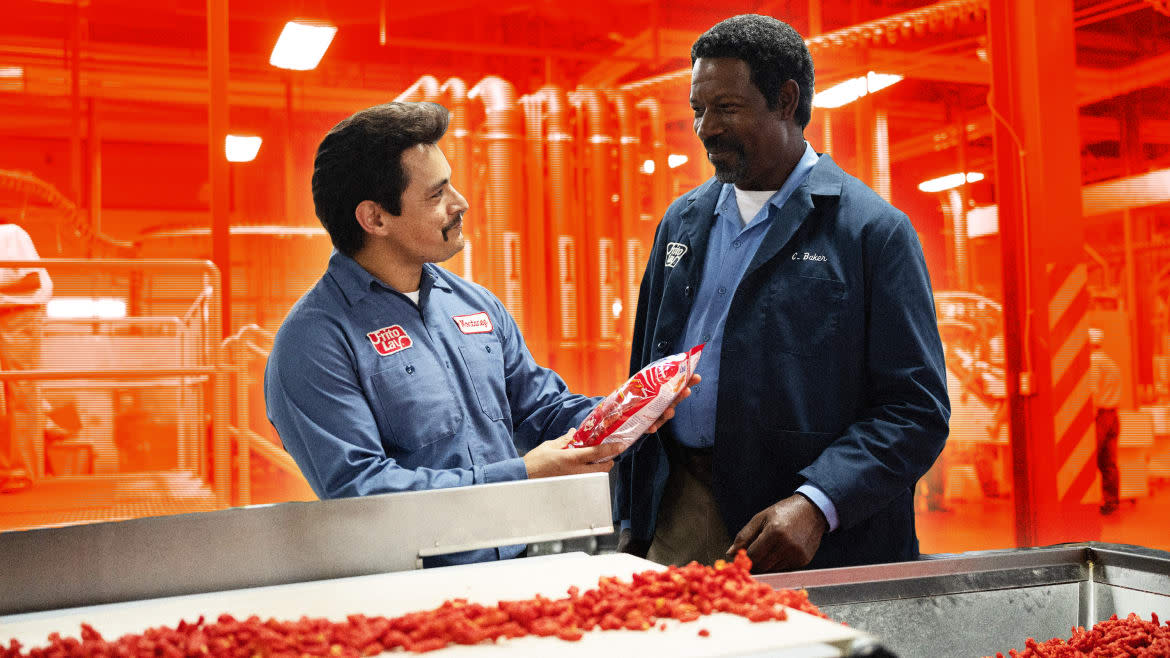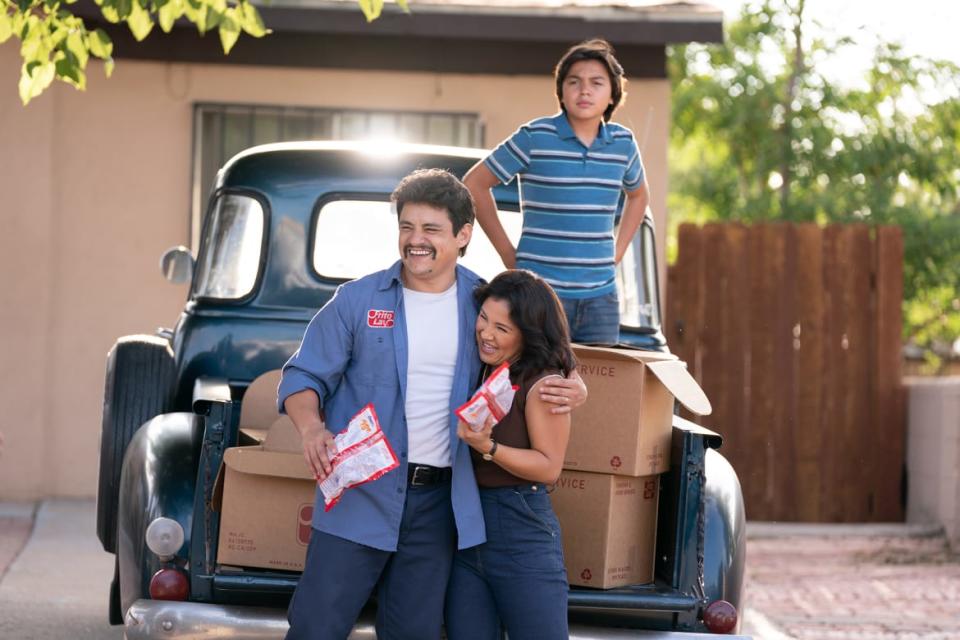‘Flamin’ Hot’ Creators Don’t Mind That Its Origin Story Was Debunked

When asked if she recalls the first time she ate a Flamin’ Hot Cheeto, screenwriter Linda Yvette Chávez—whose latest film, the Eva Longoria-directed Flamin’ Hot, debuts June 9 on Disney+ and Hulu—broke out a smile and offered a long, pregnant, “Listen.”
“Those are every Mexican kid’s lifeline,” Chávez told The Daily Beast’s Obsessed, ahead of the film’s release. “So I grew up eating those Cheetos like crazy—with the chopsticks, trying to not get the little prints on my hands.”
Flamin’ Hot is a sort-of biopic based on Frito-Lay alum Richard Montañez’s story of how he (allegedly) invented the Flamin’ Hot Cheeto. Longoria, who has directed several episodes of television over the years, makes an accomplished debut as a feature director.
Eva Longoria’s ‘Flamin’ Hot’ Knows Exactly What It’s Selling
Montañez has been telling his Flamin’ Hot Cheetos story for years and generated considerable buzz during the mid-2010s. But a 2021 Los Angeles Times report, which was based on interviews with more than a dozen former employees, the company archival record, and statements from Frito-Lay itself, found that Montañez never actually invented the Flamin’ Hot Cheeto. Instead, he simply rose through the corporate ranks and created other snacks instead.
When the film premiered this March at Austin’s South by Southwest, Longoria explained the premise of the film to the Times. “We never set out to tell the history of the Cheeto,” she said. “We are telling Richard Montañez’s story, and we’re telling his truth.”
While speaking with The Daily Beast, Chávez noted that the 2021 Times report broke right around when Flamin’ Hot was entering production—more than two years after they’d begun work on the script. Echoing Longoria’s words, she said, “Ultimately, for me, this is not a documentary—it’s a powerful film about Richard’s story.” The screenwriter and Longoria were united in that understanding.

“Oftentimes, as we’ve seen with U.S. history, certain narratives can be erased or changed, and it's very easy to do that,” Chávez added. “But what I know that I was telling was a story of Richard… his success, and his rise, and his story about his family from the bottom to the top.
When she sat down to speak with Montañez and his wife at the beginning of the project, Judy, Chávez felt that she “didn’t need them to prove anything,” she said. “I felt it in my bones as I heard them. I heard my mom, I heard my dad, I heard my cousin, I heard myself.” The conversation made her think of examples from her own life of “things left unsaid, the things that were manipulated that maybe I didn't receive credit on.”
“It’s hard to describe how complicated it is to be a person of color in this country,” she concluded. “And I know how complicated it is.”
‘Gentefied’ Was Already One of Netflix’s Best Shows. It Just Leveled Up.
A Chicana director born and raised in Norwalk, California, Chávez creates the kinds of characters that instantly win you over. Gentefied, the Netflix series she co-created with Marvin Lemus in 2020, was a compelling answer to Latinx trauma porn—serious but ultimately upbeat, and filled with intriguing questions about identity, community, and gentrification.
When she first met Longoria, Chávez said, they instantly connected. “She’s hilarious, first of all, and she also just reminds me so much of my family—like, I walked in, and I was like, ‘Girl, you’re like my prima,” Chávez said, meaning cousin. Beyond that, Longoria “has a million ideas,” the screenwriter said. “Comedically, she’s so brilliant. I always say this: I didn’t feel like I was walking into work with a first-time director. I felt like I was walking into work with a veteran.”
Annie Gonzalez, who plays Montañez’s wife, Judy, in Flamin’ Hot, also starred in Gentefied, as the formidable Lidia Solis. She’s been friends with Chávez for a decade. At first, Chávez didn’t think Gonzalez would go for the role; she’d said before that she was getting tired of always playing mother characters. Thankfully, however, there was enough to Judy’s character to change Gonzalez’s mind—it’s her forceful on-screen presence that really anchors Flamin’ Hot. (If you want to make it in this world, Jesse García’s Montañez tells us, “get yourself a Judy.”)
For Chávez, her shared history with Gonzalez makes their ongoing collaboration all the more special. “We always talk about how we mirror each other,” she said. “To be able to come up in this industry together in ways that most of our families have never experienced, it’s just an incredible, incredible thing for us.”

Although Richard Montañez is the obvious protagonist in his own story, Chávez emphasized that his victory does not belong to him alone—and it was important to her that both the character and audiences understand that as well.
“I love to write [for] the men in my community—their voice,” Chávez said. “Oftentimes, people would think that the characters in Gentefied that were men, it was Marvin [writing them]. But most of the time, it was actually me.”
Chávez wants the men in her community to open up and make more room for their feelings. In that sense, she said, “I think Richard’s story, to me, was very much a story of a man who was so vulnerable and so open—and so willing to ask for help,” including from his wife and family. Father-son relationships pervade the film, Chávez noted, as Richard asks himself whether he can be a good father figure to his own son—a better and more emotionally engaged one, he hopes, than his own.
“I also had a huge goal to make grown machista men cry with the movie,” Chávez said with a grin, “and they have been crying. … I had some guys come up to me and be like, ‘Man, do we all have daddy issues?’ And I’m like, ‘Yeah, you do, so let it out, man. Let it out.’”
And if you’d rather not, you can always claim that some spice got in your eye.
Get the Daily Beast's biggest scoops and scandals delivered right to your inbox. Sign up now.
Stay informed and gain unlimited access to the Daily Beast's unmatched reporting. Subscribe now.

 Yahoo News
Yahoo News 
